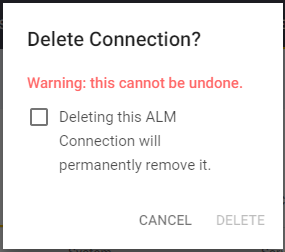System Issue Tracker connectors
A system Issue Tracker connector captures general configuration settings that are applied to all SD Elements project Issue Tracker connections linked to it.
Security sensitive configurations, such as server, username, and password, as well as common settings, are generally set at the system level.
-
Consistency: Issue Tracker connections based on a system connector share the same underlying configuration.
-
Confidentiality: Project teams can connect to an Issue Tracker without ever knowing the credentials used to connect with the system.
Add/Edit an Issue Tracker connector
Add or update a system Issue Tracker connector by following the steps below.
-
The user has the permission Global Roles→Integration→Edit Issue Tracker connections
-
The username/password or API token needed to connect with the Issue Tracker tool.
-
This credential is typically a provisioned service account in the Issue Tracker tool that can create issues in any anticipated projects.
-
The admin team responsible for the Issue Tracker tool can help you create one or identify a service account.
-
-
Knowledge of which tasks to integrate with the Issue Tracker tool.
-
Select tasks based on status, phase, priority and so on.
-
-
From the gear icon [settings] menu, select Integration.
-
To add a connection, click plus [add circle] button for a New Issue Tracker Connection.
-
To edit an existing connection, hover your mouse over the row on the far right and select the edit [edit] icon.
-
-
Enter the following information:
-
System: Select the appropriate Issue Tracker tool, such as JIRA or Agile.
-
Name: Enter a name for the connection.
-
-
Enter the requested configuration for the selected Issue Tracker tool.
-
Client side certificate: Optionally, upload a client side certificate and an encrypted or decrypted private key for use in synchronization.
ImportantEnter the correct values for these fields instead of using the default values to ensure the integration is successful.
-
-
Click Create or Done at the bottom of the form.
The connector changes take effect in the system immediately, and projects can use the new settings in new or existing connections.
|
Note
|
Most errors during an Issue Tracker setup and execution are due to insufficient permissions. |
Test an Issue Tracker connector
To test the configuration of an Issue Tracker connector follow the steps below.
-
The user has the permission Global Roles→Integration→Edit Issue Tracker connections
-
From the gear icon [settings] menu, select Integration.
-
Search for the connection.
-
Hover your mouse over the row on the far right and select the edit [mode edit] icon. A dialog will appear.
-
Click Test Connection at the bottom-left of the dialog.
The system will connect to the Issue Tracker and verify the provided configuration. A message will appear on the bottom-right with either a pass:

or an error:

In the case of an error, the details will be displayed at the bottom of the connector’s form.
Delete an Issue Tracker connector
To delete a system Issue Tracker connector follow the steps below.
-
The user has the permission Global Roles→Integration→Edit Issue Tracker connections
-
From the gear icon [settings] menu, select Integration.
-
Search for the connection and click its name.
-
Hover your mouse over the row on the far right and select the trashcan [delete] icon. A dialog will appear.

-
Acknowledge the warning.
-
Click Delete.
The Issue Tracker connector is removed from the system as well as any project Issue Tracker connections tied to it.
